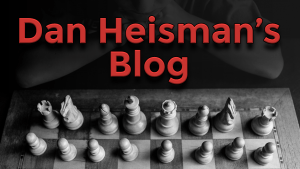Maximizing Learning per Unit Time
I sometimes get asked "When reading a book of annotated games, wouldn't you learn more if you studied a game slowly than read it quickly?" Of course that is true for each game, but it skirts the real issue. And it's clearly true in absurdum: you could study a game so quickly you would not get anything out of it, so slower would certainly be better.
However, in general, it's not the speed of studying the game that is critical to maximize improvement. What is critical is that you are trying to learn more per unit time than (say) per unit game. In many cases this means that reading most games at a moderate pace may be more efficient than intense dissection of each game, since you can read many more games in the same amount of time.
On the other hand, you would want to learn more per unit game if:
- There were only a small availability of good annotated games to study (if it were so, getting the most of each game would be precious), or
- You were immortal and time was not a consideration.
However, the supply of well-annotated games - and authors with differing but instructive views - is quite large, even if you restrict yourself to instructive anthologies to maximize learning. As for the second point, I can assume most of the readers are mortal (if not, I have some good investment suggestions for you as compounding is quite effective in the looong run...).
Economists have a principle called diminishing returns. That means in some endeavors you might reach a point where the amount of benefit you get out of doing something begin to lessen the more you do it.
For example, if McDonald's expands from 1 restaurant to 10,000 in the US, they make a lot more money (possibly 10,000 times as much or more, due to economy of scale), but they don't again make 10,000 times as much if they expand from 10,000 to 100,000,000 restaurants, since there would be a couple MacDonald's on every block and they would compete with each other.
In chess this is true, too: For example, you usually get really good returns from the first few minutes you spend analyzing a position but, due to several factors, analyzing those same additional number of minutes after you have already analyzed the position for an hour will usually not get you nearly as much; e.g. minutes 0-5 yield more information than minutes 60-65 studying the same position [Even going to 60 is not necessary; in The Seven Deadly Chess Sins, p.173, GM Rowson states "In my experience, it is very rare for a think of more than twenty minutes to lead to a good move. Normally if you think for this long, or longer, you just end up confusing yourself and forgetting which line is which." However, long thinks is not the subject of this article - it's just an example of one type of diminishing return in chess.]
Diminishing returns is easy to show with regards to how many times you study the same game; less easy to show with regard to how much time you spend on an individual game - but I'll try:
Suppose each time you go through a game, you elicit 50% of the information that you already did not know/understand previously from reading that game. Then going through a game once will receive 50% (1/2) of what the author is trying to communicate, twice 75% (3/4), three times 87.5% (7/8), and so on. So clearly each time you are learning more, but getting diminishing returns on each subsequent pass.
Using this metric, if you read 50 games three times each you get a total of 87.5%*50 = 43.75 "learning units" for your 150 games read, but if you just read 150 different games, you get 50%*150 = 75 of the same unit since there's no diminishing returns. With these assumptions (admittedly not scientifically derived), that's about 70% more learning in the same timeframe.
Similarly, suppose going over a game in 20 minutes gets you 30% of what the author is trying to teach you, but taking 40 minutes only gets you up to 45%, since studying the game in more and more detail usually - but not always - gets diminishing returns. Then reading 500 games for 40 minutes each (20,000 minutes) gets 500*0.45 = 225 learning units, while reading 1000 games at 20 minutes each (the same 20,000 minutes) gets 1000*0.3 = 300 learning units.
When I started, I used the ideas discussed in Reviewing Chess Games to read about 2,000 annotated master games in about 3 years (see Annotated Game Collections vs Instructive Anthologies). I skipped any part of the analysis that was not fun (see Chess, Learning, and Fun), concentrating on what the author wrote in the text about the game position, to maximize my learning per unit time. Recently I timed myself at about 8 minutes per game, but I am sure I was somewhat slower when I started. (In Reviewing Chess Games I note that it's occasionally quite helpful to vary from the norm and review some games either very quickly or very slowly, but that's getting away from the issue).
Reading many different authors helped me develop a "chess conscience." This worked rather well, as I went from unrated to USCF 1900 in two years (July 1966 to July 1968) and then to 2000 in three years (by Sep 1969).
Of course, I did many other things than just read annotated games: play in every tournament I could, join a strong chess club and review my games with strong players, look up even my speed games afterwards in MCO-10 to make sure I wasn't making the same mistake over and over, etc. These are all important steps. But clearly reading that many annotated master games was a key part in my development. And, in discussing my experience with other strong players, many of them also got a significant portion of their development from playing out many annotated games, at one speed or another. It may not be as important as "hanging out with strong players and talking chess with them" or even repetitious study of easy tactics, but it's one of the most important things you can do.






